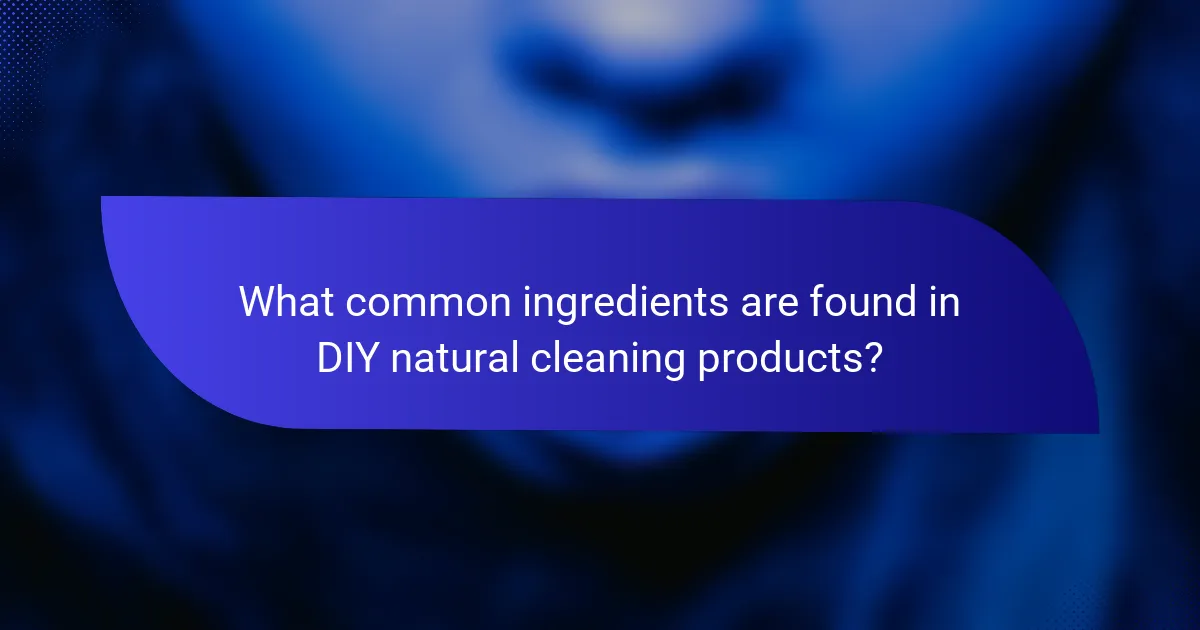Natural cleaning products provide health benefits by reducing exposure to harmful chemicals and improving indoor air quality. They support sustainable practices and minimise environmental impact. This article explores common DIY ingredients, effective recipes, and unique cleaning techniques to maximise their effectiveness. Additionally, it addresses challenges in transitioning to natural cleaning solutions.

What are the health and environmental benefits of using natural cleaning products?
Natural cleaning products offer significant health and environmental benefits. They reduce exposure to harmful chemicals, promoting better indoor air quality and minimising allergic reactions.
Health benefits include fewer respiratory issues and skin irritations, as these products often contain natural ingredients like vinegar and baking soda. Environmentally, they decrease water pollution and reduce plastic waste by using biodegradable packaging.
Additionally, using natural cleaning products supports sustainable practices, as they are often made from renewable resources. This shift can help preserve ecosystems and promote healthier living spaces.
How do natural cleaning products contribute to indoor air quality?
Natural cleaning products significantly improve indoor air quality by reducing harmful chemicals. They contain natural ingredients that minimise toxins, leading to fewer respiratory issues and allergies. Using products like vinegar or baking soda can effectively clean surfaces without releasing volatile organic compounds. As a result, homes become safer and healthier environments, promoting overall well-being.
Why are natural ingredients safer for children and pets?
Natural ingredients are safer for children and pets because they are less toxic and free from harmful chemicals. Many conventional cleaning products contain substances that can cause skin irritation or respiratory issues. Natural cleaning products, such as those made with vinegar or baking soda, are effective yet gentle. As a result, they minimise health risks while maintaining cleanliness. This safety aspect is particularly important in households with vulnerable individuals.
Which environmental impacts are reduced by using eco-friendly cleaning solutions?
Using eco-friendly cleaning solutions significantly reduces harmful environmental impacts. These products minimise water pollution, decrease greenhouse gas emissions, and lower toxic chemical exposure.
Eco-friendly cleaning solutions often contain biodegradable ingredients, which break down naturally and do not harm aquatic ecosystems. They also reduce air pollution by avoiding volatile organic compounds (VOCs), which contribute to smog and respiratory issues.
By choosing natural cleaning products, consumers help preserve biodiversity and promote sustainable practices in manufacturing and disposal. This shift not only benefits individual health but also supports a healthier planet.

What common ingredients are found in DIY natural cleaning products?
Common ingredients in DIY natural cleaning products include vinegar, baking soda, lemon juice, essential oils, and castile soap. These ingredients effectively clean, deodorise, and disinfect surfaces without harsh chemicals. Vinegar acts as a natural disinfectant, while baking soda provides gentle abrasion for scrubbing. Lemon juice adds a fresh scent and antibacterial properties. Essential oils enhance cleaning power and offer pleasant fragrances. Castile soap serves as a versatile base for various cleaning solutions.
How does vinegar work as a cleaning agent?
Vinegar works as a cleaning agent due to its acetic acid content, which effectively dissolves dirt, grime, and mineral deposits. It acts as a natural disinfectant, killing some bacteria and viruses. The acidity also helps to neutralise odours and break down grease. This makes vinegar a versatile and eco-friendly alternative to chemical cleaners.
What role does baking soda play in natural cleaning recipes?
Baking soda is a versatile ingredient in natural cleaning recipes. It acts as a mild abrasive, effectively removing stains and grime without scratching surfaces. Additionally, baking soda neutralises odours, making it ideal for freshening up spaces. Its alkaline nature helps break down grease and dirt, enhancing cleaning power. This unique attribute makes it a staple in eco-friendly cleaning solutions.
Which essential oils are most effective for cleaning and why?
Essential oils like tea tree, lemon, and lavender are highly effective for cleaning due to their antibacterial and antifungal properties. Tea tree oil, for instance, contains compounds that eliminate germs, making it ideal for disinfecting surfaces. Lemon oil not only provides a fresh scent but also acts as a natural degreaser and stain remover. Lavender oil offers antimicrobial benefits while adding a pleasant aroma. These oils can enhance the cleaning power of natural products, ensuring a safer home environment.

How can you create your own natural cleaning products at home?
You can create natural cleaning products at home using simple ingredients like vinegar, baking soda, and essential oils. Combine equal parts vinegar and water in a spray bottle for an all-purpose cleaner. For tough stains, mix baking soda with water to form a paste. Essential oils like lemon or tea tree oil add pleasant scents and antibacterial properties. Experiment with ratios to find your preferred strength and scent.
What are some simple recipes for multi-surface cleaners?
Natural cleaning products can be made easily at home using simple ingredients. Here are three effective recipes for multi-surface cleaners.
1. Vinegar and Water: Mix equal parts of white vinegar and water in a spray bottle. This solution effectively cuts through grease and disinfects surfaces.
2. Baking Soda Paste: Combine baking soda with a small amount of water to create a paste. Apply it to tough stains, let it sit, then scrub and rinse.
3. Lemon Juice and Olive Oil: Mix one part lemon juice with two parts olive oil. This cleaner works well for polishing wood surfaces while providing a fresh scent.
How to make a natural glass cleaner with household ingredients?
To make a natural glass cleaner with household ingredients, mix equal parts of white vinegar and water in a spray bottle. This solution effectively cleans glass surfaces without harsh chemicals.
Here are the steps to create your natural glass cleaner:
1. Gather ingredients: white vinegar, water, and a spray bottle.
2. Measure equal parts of white vinegar and water.
3. Pour the mixture into the spray bottle.
4. Shake gently to combine.
5. Spray onto glass surfaces and wipe with a microfiber cloth for a streak-free finish.
This cleaner harnesses the root attribute of vinegar’s acidity to cut through grime, making it a safe and effective choice for household cleaning.
What are the steps to formulate a homemade laundry detergent?
To formulate a homemade laundry detergent, follow these steps:
1. Gather ingredients: You will need washing soda, borax, and a bar of soap (like castile or Fels-Naptha).
2. Grate the soap: Use a cheese grater to finely shred the bar of soap.
3. Mix the dry ingredients: Combine one cup of grated soap, one cup of washing soda, and one cup of borax in a large bowl.
4. Store the detergent: Transfer the mixture to an airtight container for easy use.
This natural detergent is effective and eco-friendly, making it a great alternative to commercial products.

What are the challenges of switching to natural cleaning products?
Switching to natural cleaning products can present several challenges. These include limited availability, higher costs, and potential effectiveness concerns. Users may find it difficult to identify suitable products or recipes that match their cleaning needs. Additionally, some natural ingredients may cause allergic reactions or require careful handling, complicating the transition.
How do effectiveness and convenience compare to conventional cleaners?
Natural cleaning products often match or exceed the effectiveness and convenience of conventional cleaners. They utilise safe, biodegradable ingredients that effectively tackle dirt and grime. For example, vinegar and baking soda can effectively disinfect surfaces and eliminate odours. Additionally, natural cleaners typically come in eco-friendly packaging, promoting sustainability. Users often find the pleasant scents of essential oils in natural products more appealing than synthetic fragrances. Overall, natural cleaning products provide a practical, effective alternative to traditional cleaners while supporting environmental health.
What misconceptions exist about the efficacy of natural cleaning solutions?
Many misconceptions exist about the efficacy of natural cleaning solutions. Some people believe they are less effective than chemical cleaners, but studies show natural products can effectively eliminate bacteria and allergens. Another misconception is that natural cleaning solutions require more time or effort, while many DIY recipes are quick and easy to prepare. Additionally, some assume that natural products are always safe, but certain ingredients can still cause allergic reactions or irritations. Understanding these misconceptions can help consumers make informed choices about their cleaning products.

Which unique cleaning techniques can enhance the use of natural products?
Unique cleaning techniques that enhance natural products include using steam cleaning, ultrasonic cleaning, enzyme-based cleaners, and natural abrasive methods. These techniques maximise the effectiveness of natural cleaning agents while reducing reliance on harsh chemicals. For example, steam cleaning uses high temperatures to kill bacteria and lift dirt, enhancing the cleaning power of vinegar or baking soda. Ultrasonic cleaning employs sound waves to create microscopic bubbles that gently clean surfaces, making it ideal for delicate items. Enzyme-based cleaners break down organic stains, while natural abrasives like salt or baking soda provide scrubbing power without scratching surfaces.
How can you use steam cleaning in conjunction with natural products?
Steam cleaning can enhance the effectiveness of natural cleaning products by utilising high temperatures to eliminate dirt and germs. Combining steam cleaning with natural ingredients like vinegar or baking soda can boost cleaning power without harmful chemicals. For example, use steam to activate the cleaning properties of vinegar, resulting in a deeper clean for surfaces. Additionally, steam cleaning can help dissolve grease and grime, making it easier for natural products to work effectively. This method is eco-friendly and promotes a healthier home environment.
What are the benefits of using microfiber cloths with natural cleaners?
Using microfiber cloths with natural cleaners enhances cleaning effectiveness and reduces chemical exposure. Microfiber traps dirt and bacteria, making it ideal for effective cleaning without harsh chemicals. This combination promotes a healthier home environment and supports eco-friendly practices. Additionally, microfiber cloths are reusable, reducing waste compared to disposable options. Their durability ensures long-term cost savings while maintaining cleaning quality.

What best practices should you follow when using natural cleaning products?
To effectively use natural cleaning products, follow these best practices: choose eco-friendly ingredients, test on small surfaces, measure ingredients accurately, store properly, and label containers clearly. These steps ensure safety and effectiveness while maximising the benefits of natural cleaning solutions.
How can you safely store homemade cleaning solutions?
To safely store homemade cleaning solutions, use airtight containers and label them clearly. Keep them out of direct sunlight and away from heat sources. Store in a cool, dry place to maintain effectiveness and prevent degradation. Avoid mixing different solutions to ensure safety.
What common mistakes should be avoided when making DIY cleaners?
Avoid using incorrect ratios, mixing incompatible ingredients, neglecting safety precautions, and overlooking storage conditions when making DIY cleaners. These mistakes can reduce effectiveness and pose health risks. For instance, combining vinegar and baking soda creates a fizz but loses cleaning power. Always measure ingredients accurately to ensure optimal performance.
Which tips can help optimize the cleaning process with natural products?
Use these tips to optimize the cleaning process with natural products: choose the right natural ingredients, prepare solutions in advance, use appropriate tools, and follow a systematic approach.
1. Select effective natural ingredients like vinegar, baking soda, and essential oils for specific tasks.
2. Mix solutions ahead of time to save effort during cleaning sessions.
3. Utilize microfiber cloths and brushes to enhance cleaning efficiency.
4. Tackle one area at a time to maintain focus and thoroughness.